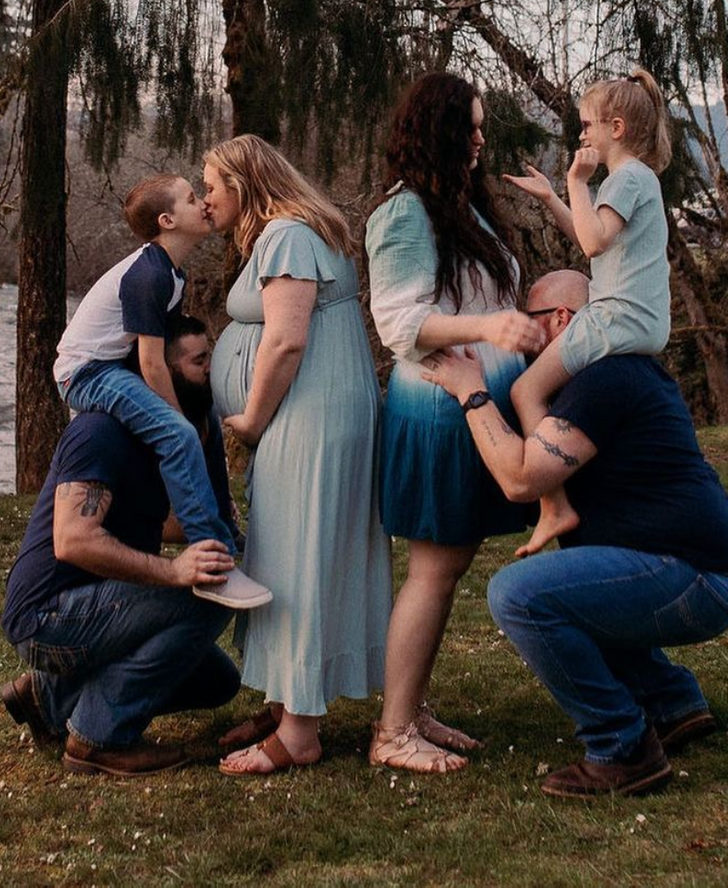Two couples who embarked on a unique four-way relationship openly share their experiences with ’polyfamory.’ All four partners are active parts of an unconventional family structure, where they reside in a romantic quad under one roof, nurturing their children together. And while some people may question the sanity of such an arrangement, the four parents state all the reasons why this changed their lives and that of their kids for the better.
From friends to lovers

Alysia Rodgers, 34, and her spouse Tyler, 35, crossed paths with Sean Hartless, 46, and his wife Taya, 28, from Oregon, without prior knowledge of the term “polyamory” — a concept where an individual maintains multiple simultaneous romantic partnerships. However, as their emotions grew, the couples enthusiastically embraced the practice of polyfamory.
In a recent interview, the couples elaborated on their journey from friends to romantic partners and the subsequent decision to cohabit, fostering a harmonious environment for their children.
Informing the kids of the additional family members

Shortly after their initial meeting, Sean and Taya began commuting two hours to visit Alysia and Tyler. However, as the exhaustion from these lengthy drives grew, they collectively made the decision to move into a new house together in 2020, transitioning from polyamory to polyfamory.
Tyler and Alysia, who already had two children aged seven and eight, found it surprisingly easy to explain their new lifestyle to their kids. They informed their children that their mother had a boyfriend (Sean) and their father had a girlfriend (Taya), emphasizing that Sean and Taya should be treated as additional parental figures.
The addition of 2 more kids to the newly expanded family

Since they started living together, the polyfamory arrangement has resulted in the addition of two more children. Alysia gave birth to one child, while Taya gave birth to the other. However, the biological paternity of their 22-month-old and 15-month-old remains unknown, as they intentionally chose not to prioritize genetics. They firmly believe that all parents are equal to every child, and this principle is not up for debate or discussion.
While their lifestyle may raise questions among strangers, Tyler highlighted the immense support they have with “four sets of adult hands” to assist in various tasks. He acknowledged that such help is exceptionally rare and greatly beneficial. Alysia, Tyler, and Sean all maintain full-time employment, while Taya assumes the role of a stay-at-home parent, caring for the children.

Sean expressed his deep sense of relief in knowing that the children are always under the care of at least one of the adults in the polyfamory arrangement. This provides him with a significant source of comfort and reassurance.
Furthermore, the unusual family structure allows their children to learn valuable lessons about the dynamics of different types of families. They grow up with a profound understanding that all of their parents will unconditionally love and support them, regardless of the circumstances they may encounter. This fundamental knowledge provides a strong foundation for their emotional well-being and sense of security.
Just like any other family, they have their low moments.

The couple acknowledges that, despite their gratitude for the support they provide each other in parenting, there are instances when their different approaches clash. Sean openly admits to sometimes displaying a more “harsh” parenting style and recognizes the need to learn and adapt, engaging in conversations about embracing gentler parenting methods.
In the face of various challenges, including occasional jealousy, encountering judgment from strangers, and facing limited acceptance from family members, Tyler, Alysia, Sean, and Taya firmly believe that the advantages of their polyfamory lifestyle outweigh the disadvantages. They particularly emphasize the positive aspect of their children being surrounded by multiple loving adults within their home.
The polyfamory dynamic is gaining popularity and becoming more accepted with time.

Sean observes that while polyamory is becoming more recognized, popular shows like Sister Wives, which portray individuals married to multiple partners, have created negative associations with polyamorous families. He highlights that in contrast to the depiction in the TV series, Tyler, Alysia, and Taya strive for equality and actively work towards establishing equitable relationships within their polyfamory dynamic.

Polyamorous relationships have gained popularity in recent years, and there are obvious reasons why this type of relationship can be right for certain people.
Moreover, a study conducted in 2021, which surveyed 3,438 single adults, revealed that one in six participants expressed a desire to be polyamorous. Additionally, one in nine individuals reported having been involved in a polyamorous relationship at some point, and one in fifteen stated that they knew someone who identified as polyamorous.


